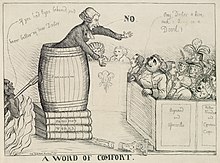Test Act
 Parliament of England | |
| Long title | An act for preventing dangers which may happen from popish recusants |
|---|---|
| Citation | 25 Car. II. c. 2 |
| Territorial extent | |
| Dates | |
| Royal assent | 1673 |
| Commencement | 1673 |
| Other legislation | |
| Amended by | Test Act 1678 |
Status: Repealed | |
The Test Acts were a series of English penal laws that served as a religious test for public office and imposed various civil disabilities on Roman Catholics and nonconformists. The principle was that none but people taking communion in the established Church of England were eligible for public employment, and the severe penalties pronounced against recusants, whether Catholic or nonconformist, were affirmations of this principle. In practice nonconformists were often exempted from some of these laws through the regular passage of Acts of Indemnity. After 1800 they were seldom enforced, except at Oxbridge, where nonconformists and Catholics could not matriculate (Oxford) or graduate (Cambridge). The Conservative government repealed them in 1828 with little controversy.
Contents
1 Corporation Act 1661
2 Test Act of 1673
3 1678 Act
4 Repeal
5 References
6 Further reading
7 External links
Corporation Act 1661
The Corporation Act of James I provided that all such as were naturalized or restored in blood should receive the sacrament of the Lord's Supper. It was not, however, until the reign of Charles II that actually receiving communion in the Church of England was made a precondition for holding public office. The earliest imposition of this test was by the Corporation Act of 1661 requiring that, besides taking the Oath of Supremacy, all members of corporations were, within one year after election, to receive the sacrament of the Lord's Supper according to the rites of the Church of England.
Test Act of 1673
This act was followed by the Test Act of 1673[1] (25 Car. II. c. 2) (the long title of which is "An act for preventing dangers which may happen from popish recusants"[2]). This act enforced upon all persons filling any office, civil or military, the obligation of taking the oaths of supremacy and allegiance and subscribing to a declaration against transubstantiation and also of receiving the sacrament within three months after admittance to office. The oath for the Test Act of 1673 was:
I, N, do declare that I do believe that there is not any transubstantiation in the sacrament of the Lord's Supper, or in the elements of the bread and wine, at or after the consecration thereof by any person whatsoever.
The act was passed in the parliamentary session that began on 4 February 1673; the act is dated as 1672 in some accounts because the Julian calendar then in force held that the new year did not begin until Lady Day, or 25 March. The correct date using the modern Gregorian calendar is 1673.[3]
1678 Act
Initially, the Act did not extend to peers; but in 1678 the Act was extended by a further Act (30 Car. II. st. 2[4]) which required that all peers and members of the House of Commons should make a declaration against transubstantiation, invocation of saints, and the sacrament of Mass.[5] The effect of this was to exclude Catholics from both houses, and in particular the "Five Popish Lords" from the House of Lords, a change motivated largely by the alleged Popish Plot. The Lords deeply resented this interference with their membership; they delayed passage of the Act as long as possible, and managed to greatly weaken it by including an exemption for the future James II, effective head of the Catholic nobility, at whom it was largely aimed.[6]
Repeal

A 1790 cartoon satirizing the efforts of Charles James Fox to get the Test and Corporation Acts repealed. British natural philosopher and theologian Joseph Priestley is depicted preaching from atop a pile of his own works, in a pulpit made from a barrel inscribed "FANATICISM", to Fox seated in a box pew. Fox asks, "Pray, Doctor is there such a thing as a Devil?" Priestley responds "No", as the devil himself announces, "If you had eyes behind, you'd know better my dear Doctor".
The necessity of receiving the sacrament as a qualification for office was repealed in 1828 and all acts requiring the taking of oaths and declarations against transubstantiation were repealed by the Catholic Relief Act 1829. Sir Robert Peel took the lead for the government in the repeal and collaborated with Anglican Church leaders.[7]
References
^ University of London & History of Parliament Trust
^ 'Charles II, 1672: An Act for preventing Dangers which may happen from Popish Recusants.', Statutes of the Realm: volume 5: 1628–80 (1819), pp. 782–85. URL: http://www.british-history.ac.uk/report.asp?compid=47451. Date accessed: 6 March 2007.
^ Plunknett, Theodore, Studies in English Legal History Hambledon Press 1983 p. 323
^ 'Charles II, 1678: (Stat. 2.) An Act for the more effectuall preserving the Kings Person and Government by disableing Papists from sitting in either House of Parlyament.', Statutes of the Realm: volume 5: 1628–80 (1819), pp. 894–96. URL: http://www.british-history.ac.uk/report.asp?compid=47482. Date accessed: 6 March 2007.
^ 1911 Encyclopædia Britannica, Test Acts
^ Kenyon, J.P. The Popish Plot 2nd Edition Phoenix Press 2000 pp. 104–5
^ Norman Gash, Mr Secretary Peel (1961) pp: 460–65; Richard A. Gaunt, "Peel's Other Repeal: The Test and Corporation Acts, 1828," Parliamentary History (2014) 33#1 pp 243–262.
Further reading
- Ditchfield, Grayson M. "The parliamentary struggle over the repeal of the Test and Corporation Acts, 1787-1790." English Historical Review 89.352 (1974): 551-577. online
- Loades, David, ed. Reader's Guide to British History (2003) 2:1262-63; historiography
- Machin, G. I. T. "Resistance to Repeal of the Test and Corporation Acts, 1828." Historical Journal 22.1 (1979): 115-139.
External links
Committees for the Repeal of the Test and Corporation Acts: the minutes of two committees for the repeal of the Act. First published by the London Record Society, available as part of British History Online.
